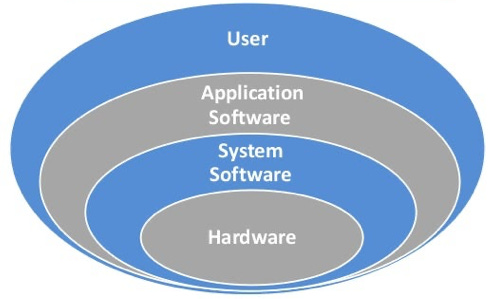Feake Hills, Crooked Waters - The Software Issue
The StartSometimes there’s a technology that captures our minds so much that it becomes a metaphor for practically everything. The universe — and the mind — seemed like an infinitely complex clockwork back in the days when the mechanisms inside clocks were new and fascinating. The “clockwork universe” showed up around the 1400s, and might have first appeared the book On the Sphere of the World by John of Sacroboso. He described the universe as the “machine Mundi.” The “machine of the world.” Then came steam engines. They were an expression of the power that could be wielded if you had the understanding, and the craft, to shape the world. And now there’s software. Do you find yourself imagining your own mind as a kind of computer? So does everybody else, it seems. The important part of computers, the part that acts, is software. Software is a set of instructions. Magic words. You can tell the computer to perform functions it’s capable of in a particular order. But it goes beyond just that. The more I think about software, the deeper the subject seems to get. That’s what took so long to put this issue together. I was haunted by demons. The Demon-Haunted WorldI find software deeply captivating. But what it is about software is not so clear. Is it the idea of instructions causing actions? I think it might be a recognition that these are real magic words. The core notion of magic (at least the popular depiction of magic that I know about) is that words can have power. If you know the “true name” of a thing, or a person, you can control it, or them. Speak the right words, the secret words, and your wants and needs can be fulfilled without going through the tedious rigamarole of, you know, working indirectly to get the money to buy the stuff or hire the people that you can use to fulfill the needs that you hopefully remember at that point. It might not be without cost — even Harry Potter has to study his spells — but the payoff is far more immediate than you get from, say, a degree in chemistry. It’s the numinous, glowing power beneath magic words that’s behind the magnetism of software. In the early days of computers, your magic words mostly controlled other glowing words on screens. More recently the magic words control images that grow more and more toward life — toward reality — every year. And even more recently, you can put on a set of magic glasses and see your magic words control things that exist in three dimensions. You can’t quite touch them though. Not yet. The magic is trying to emerge into our reality, and it’s looming closer and closer. I think this underlying idea was expressed in ancient times too. Spirits. Demons. Magic. You can even find some commentary here and there online — I don’t know whether it’s intended to be serious — about the internet being created by, or maybe consisting of, demons. But de-invest those words; remove their emotional baggage. The word “demon” is an ancient attempt to describe something that’s active in some world — not necessarily our “real world” — and that can exert some agency. A little bit like one of us; an active participant in a universe. Our convenient modern metaphors give us a bit more lexical range: software, apps, computers, networks, internet, computer learning, artificial intelligence. We may have only a rudimentary grasp of the real details of all these things, but maybe that’s not important. Maybe it’s vocabulary itself that makes us feel more in control, superior and in possession of a certain degree of mastery. Those uninformed ancients lacked our metaphorical scope, right? Or did they? Have you ever explored the intricacies of the language and lexical range of the alchemists? They had a surprising metaphorical scope. And the myriad details of the angelic and saintly realm mapped over many centuries by the Catholic church are similar; they describe a complex, multilayered reality not all that removed from how a computer operating system might be described. If we’re just thinking in terms of the language itself, things like the alchemists’ and religious scholars’ lexicons may be the equal of our “technical” argot. You might protest that the things we’re talking about — computers and software systems — deliver actual results that the old hocus-pocus stuff never could. But are you sure there’s that much difference? Other than the visual effects in modern gaming and animation, the end result of a lot of very advanced software is simply a list of things we’re told about. Complex software tells us the probabilities of a storm coming. Sometimes the storm arrives; sometimes not. But augury has been practiced before. Maybe we’re a bit better at it now, but then again… was anybody keeping detailed records of such things back then? Silicon, UniteWe usually think of software as instructions that are executed in a digital computer — a silicon substrate, so to speak. But I think that’s only one instance of software. Ada Lovelace is celebrated as the world’s first computer programmer, but the programs she wrote were made to be executed on Charles Babbage’s Analytical Engine. That was a purely mechanical computer; silicon-based semiconductors weren’t invented until a century later. Alan Turing proposed a “universal computer” that was made of paper. Danny Hillis, founder of Thinking Machines corporation, built a working computer out of Tinkertoys (you can see it at the Computer History Museum in California). So software can be executed on a variety of substrates; it doesn’t require a computer with silicon semiconductors. Chess is a game played by humans, and if it’s a computer game, it’s played on a silicon substrate. Have you ever seen a human chess game? It’s where instead of a tabletop board, you lay out an 8x8 grid big enough for people to stand in, representing the chess pieces. Now, chess is a game that’s governed by a set of rules. Instructions of a sort. It’s a metaphorical battle between two armies, directed by the opposing human players. But chess computers are common now, and at the highest level they’re as good as the best humans. So imagine a chess game where the “players” are two computer programs, and the pieces are humans. Now it’s a game played by silicon on a human substrate. So software — sets of instructions — can be executed in people. This is, in fact, something you see in practice every day. Drive around a city and you’ll find traffic signals. When they glow red, people stop their cars, and start up again when the signal turns green. That’s people following instructions — and just like the reverse chess game, traffic signals are mostly controlled by computers now, so the software is running on silicon and executed in people. In a general sense, I think there’s some discomfort with the idea of computers providing instructions to people, and for that matter, what’s all this about everybody following instructions? Aren’t we supposed to be “free” and all that? Something about the whole scenario of software programs running on a human substrate feels just a bit off. But it happens all the time, and it’s been happening for millennia. Militaries, laws, families, clans, tribes, societies, religions, corporations — they’re all, in a sense, software that runs on a substrate of people. If you study software, you’ll notice that there are different levels, or layers, that a program can run on within a silicon computer. A program can run on the most obvious layer — the user interface — or on a background layer that you, using the computer, aren’t directly aware of at all. I think the same thing happens when software runs on people. Think of a military. The primary level for its software is the “top layer,” physical behavior. You can see it, and you can command it. But sometimes the commands about physical behavior — the “instruction set” — migrates to a deeper, background layer: the mental and emotional “operating system” of the people involved. In a military you might be ordered to attack an enemy. But some people in that situation do more. There’s even a phrase for it: “above and beyond.” You’re exceeding the specific instructions you were given, and running the lower-level ideas behind those instructions to produce your own behaviors. Maybe you rescue your squad or single-handedly attack an enemy position. This is a great victory for the software installed by the military. If you do something extraordinary like that, you’re treated in an extraordinary way. You might win a medal. Or in the opposite extreme, of course, there are military firing squads. Societies are software too; the instruction set is the laws and customs that citizens follow and share. Corporations work that way too. When you’re hired, you’re given the explicit instruction set, and in many cases you’ll get information about the implicit instructions too — the “corporate culture.” The software running on humans has layers just like the silicon version. This is probably inevitable; after all, the same species that came up with societies, armies, and companies is also programming computers, and we only have so much imagination. In the case of corporations, the corporate culture and rules of conduct are one layer, and in a lot of the world, a deeper layer is the economic and legal environment the corporation “lives in.” I think “lives” is the right word here, because a corporation is in many senses a living entity. It can survive practically anything, and although in the US there was once such a thing as a “firing squad” for misbehaving corporations, that doesn’t seem to have existed for a long time. Google once had a famous motto: “don’t be evil.” That didn’t last. I would argue that it couldn’t last, because although it was part of the top-layer rule set, it directly contradicted a lower-level instruction set. After all, in corporate capitalism, evil is pretty much a foundational principle. “It’s business” is much closer to acceptable, and there’s an implicit message in that adage: go ahead and be evil; it’s expected. I haven’t even begun to touch on the kinds of software that comprise religions, families, and the like. I’ve discovered that “software” is such a powerful notion that once you start thinking of it as a basic metaphor, you can describe practically any human activity that way. And it doesn’t feel very complimentary to the humans involved. After all “just following orders” isn’t supposed to excuse behavior that’s actually evil. But in many realms, I think maybe it does. It’s just that the “orders” aren’t always stated overtly. There are so many ways we act in ways that are completely predictable, even if nobody specifically told us to. We’ve just been very well programmed. After the PartyFor a long time afterward, the party in the barn was known as “the party in the barn.” Anyone in the forest could say “remember when we went to the party in the barn,” and whoever they were talking to would say “yes, I remember the party in the barn. It was in the barn, and it was a party.” Otter and Muskrat were the first ones to answer differently. One day Hare said “remember when we went to the party in the barn,” and instead of saying “yes, I remember the party in the barn,” Otter said “which one?” At first, Hare thought it was because the party had been so long ago that Otter didn’t remember it, so he said “the one last week, Otter.” But then Otter said “which one last week?” Hare only knew about one party in the barn (it was known all around the forest as “the party in the barn”), so he thought one of two things must be happening. “Hmmm, one of two things must be happening,” he said to himself. “Otter might have gone to another party that I didn’t know about. But it’s more likely that this is just one of Otter’s jokes.” So Hare turned to Muskrat and said “You remember the party in the barn, right Muskrat?” Muskrat looked up from the book he was reading — he’d borrowed it from Beaver — and said “Never mind that, Hare. What’s gray, and wears glass slippers?” “Huh?” asked Hare. “What are you talking about, Muskrat?” “Cinderellaphant!” said Muskrat, who laughed so hard he fell over. He dropped his book, and Hare read the title: 1001 Elephant Jokes. Hare groaned. Otter shook Muskrat until he stopped laughing. “Muskrat,” he said, “I wish you’d borrowed that book before we went to the party in the barn!” “Aha!” said Hare, “you do know which party I’m talking about!” Otter tried to look innocent. “Oh,” he said, “you were talking about that party?” “Of course I was,” said Hare, “how many parties do you go to in barns?” “Oh it’s not that,” said Otter, “the real question is how many barns do I visit that have parties going on?” “That’s the real question?” asked Hare, who didn’t see the difference. Otter nodded — he was trying to nod wisely, but to Hare it looked more like he was trying to nod the way he thought somebody wise would nod. “Otter,” said Hare, “who would you say is especially wise?” “Muskrat,” said Otter. “He’s never serious.” “Am so,” said Muskrat wisely. “See what I mean?” said Otter. “That was a wisecrack if I ever heard one.” “That’s my point,” said Muskrat wisely. “Muskrat, can’t you just say something without trying to say it ‘wisely’?” asked Hare wearily. “No,” said Muskrat wisely. “Why not?” asked Hare wearily. “That,” said Muskrat wisely, “is an excellent question. I don’t know, Hare. I might just as well ask you why you’re suddenly so tired.” “You’re right,” said Hare wearily, “I am feeling tired. But not so tired that I don’t remember why I stopped by in the first place, before you and Otter started changing the subject.” “Why did you stop by?” asked Otter, who had forgotten. “I stopped by to ask you…” Hare began forgetfully. “That is,” said Hare. “What I was going to say,” said Hare, forgetfully again. “Well tarnation, Otter, now I have forgotten.” “That’s too bad, Hare,” said Otter. He frowned. “Hare,” he said, “do you ever have a feeling that you don’t recognize the word for, so you’re not sure how you’re supposed to feel?” “Sometimes,” said Hare imperiously. Then Hare said “Oh. I think I just did, Otter.” “I, for one, always know how I feel,” said Muskrat mantologically. “You do not,” said Otter. “You don’t even know what ‘mantologically’ means, Muskrat.” “Do so,” said Muskrat. “I mean I didn’t then, but I knew I was going to, and sure enough, now I do.” “Now you do what?” asked Hare, who was thoroughly confused. “Now I know what ‘mantologically’ means,” said Muskrat prophetically. “It means the same as ‘prophetically.’ It’s when you know the future.” “If you know the future,” said Otter, “then you can answer this, Muskrat. “What do you call an elephant with a carrot in each ear?” “Everybody knows that one,” said Hare. “You can call him anything you want; with carrots in his ears he can’t hear you!” Last SectionThis issue’s subtitle, How to become wise? is the question asked by Theages, the son of Demodocus. Demodocus introduces Theages to Socrates in the Dialog of Theages. It’s an ancient dialog attributed to Socrates. Modern opinion is that it is probably from a different, but still ancient, source. I used it here because that dialog is one where Socrates mentions the notion of his personal daemon. This is where the version of “daemon” used in computing comes from — it’s not the much more recent version of “demon” that’s some sort of imp or lesser devil. To Socrates, his daemon is an inner voice that warns him against mistakes, but never explains what to do. In other writings, Socrates (as reported by Plato) reports that the priestess Diotima taught him that a daemon is a sort of go-between sometimes connecting the divine and mortal realms. The section title The Demon-Haunted World, is taken from the book by Carl Sagan and Ann Durban. They were talking not about software, but about the scientific method and how (and whether) non-scientists understand it. It’s not exactly about software, but have a look at The Universe is Not What You Think It Is by Justin E. H. Smith. Here is a review that inspired some of my musings into demons and daemons. If you liked this issue of Feake Hills, Crooked Waters, please share it! |
Older messages
Bodies in Motion
Monday, May 30, 2022
Somewhere west of Laramie
Repetition
Monday, May 30, 2022
Gimme that beat, boys
The issue with numbers
Monday, May 30, 2022
You can count on it — but should you?
It’s All the Rage
Monday, May 30, 2022
But what do you do with it?
You Might Also Like
Unexpectedly at home
Tuesday, March 4, 2025
Billy stomps in the door from the bus stop. ͏ ͏ ͏ ͏ ͏ ͏ ͏ ͏ ͏ ͏ ͏ ͏ ͏ ͏ ͏ ͏ ͏ ͏ ͏ ͏ ͏ ͏ ͏ ͏ ͏ ͏ ͏ ͏ ͏ ͏ ͏ ͏ ͏ ͏ ͏ ͏ ͏ ͏ ͏ ͏ ͏ ͏ ͏ ͏ ͏ ͏ ͏ ͏ ͏ ͏ ͏ ͏ ͏ ͏ ͏ ͏ ͏ ͏ ͏ ͏ ͏ ͏ ͏ ͏ ͏ ͏ ͏ ͏ ͏ ͏ ͏ ͏ ͏ ͏ ͏ ͏ ͏ ͏ ͏
A Whopper of a Way to Pay For Your Wedding
Tuesday, March 4, 2025
Maybe it'll happen again if Jim Olive and Jane Garden get married?
Community Tickets: Advanced Scrum Master (PSM II) Class of March 26-27, 2025
Tuesday, March 4, 2025
Save 50 % on the Regular Price ͏ ͏ ͏ ͏ ͏ ͏ ͏ ͏ ͏ ͏ ͏ ͏ ͏ ͏ ͏ ͏ ͏ ͏ ͏ ͏ ͏ ͏ ͏ ͏ ͏ ͏ ͏ ͏ ͏ ͏ ͏ ͏ ͏ ͏ ͏ ͏ ͏ ͏ ͏ ͏ ͏ ͏ ͏ ͏ ͏ ͏ ͏ ͏ ͏ ͏ ͏ ͏ ͏ ͏ ͏ ͏ ͏ ͏ ͏ ͏ ͏ ͏ ͏ ͏ ͏ ͏ ͏ ͏ ͏ ͏ ͏ ͏ ͏ ͏ ͏ ͏ ͏ ͏ ͏ ͏ ͏ ͏ ͏ ͏ ͏
eBook & Paperback • Demystifying Hospice: The Secrets to Navigating End-of-Life Care by Barbara Petersen
Monday, March 3, 2025
Author Spots • Kindle • Paperback Welcome to ContentMo's Book of the Day "Barbara
How Homer Simpson's Comical Gluttony Saved Lives
Monday, March 3, 2025
But not Ozzie Smith's. He's still lost, right?
🧙♂️ Why I Ditched Facebook and Thinkific for Circle (Business Deep Dive)
Monday, March 3, 2025
Plus Chad's $50k WIN ͏ ͏ ͏ ͏ ͏ ͏ ͏ ͏ ͏ ͏ ͏ ͏ ͏ ͏ ͏ ͏ ͏ ͏ ͏ ͏ ͏ ͏ ͏ ͏ ͏ ͏ ͏ ͏ ͏ ͏ ͏ ͏ ͏ ͏ ͏ ͏ ͏ ͏ ͏ ͏ ͏ ͏ ͏ ͏ ͏ ͏ ͏ ͏ ͏ ͏ ͏ ͏ ͏ ͏ ͏ ͏ ͏ ͏ ͏ ͏ ͏ ͏ ͏ ͏ ͏ ͏ ͏ ͏ ͏ ͏ ͏ ͏ ͏ ͏ ͏ ͏ ͏ ͏ ͏ ͏ ͏ ͏ ͏ ͏ ͏ ͏ ͏ ͏
I'd like to buy Stripe shares
Monday, March 3, 2025
Hi all, I'm interested in buying Stripe shares. If you know anyone who's interested in selling I'd love an intro. I'm open to buying direct shares or via an SPV (0/0 structure, no
What GenAI is doing to the Content Quality Bell Curve
Monday, March 3, 2025
Generative AI makes it easy to create mediocre content at scale. That means, most of the web will become mediocre content, and you need to work harder to stand out. ͏ ͏ ͏ ͏ ͏ ͏ ͏ ͏ ͏ ͏ ͏ ͏ ͏ ͏ ͏ ͏ ͏ ͏
mRNA breakthrough for cancer treatment, AI of the week, Commitment
Monday, March 3, 2025
A revolutionary mRNA breakthrough could redefine medicine by making treatments more effective, durable, and precise; AI sees major leaps with emotional speech, video generation, and smarter models; and
• Affordable #KU Kindle Unlimited eBook Promos for Writers •
Monday, March 3, 2025
Affordable KU Book Promos "I'm amazed in this day and age there are still people around who treat you so kindly and go the extra mile when you need assistance. If you have any qualms about









